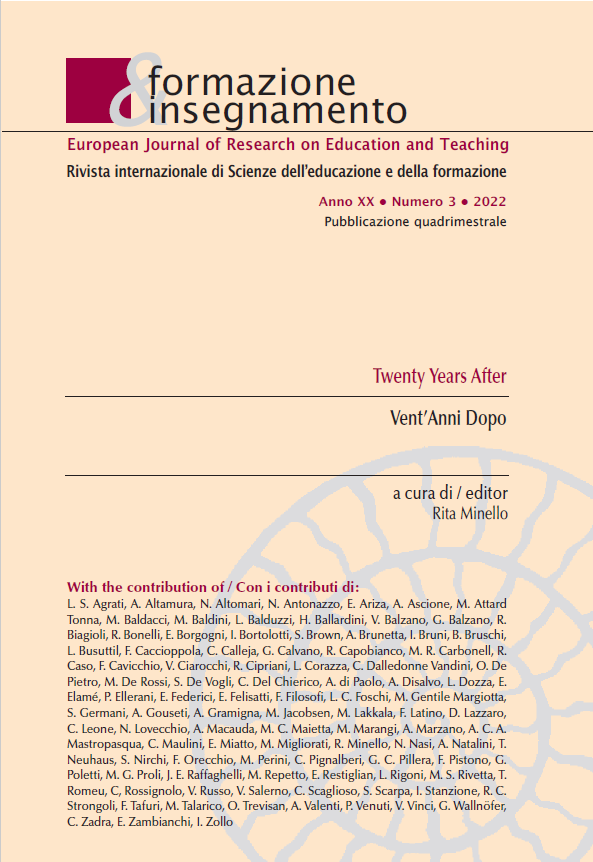Sviluppo professionale e formazione dei docenti: analisi di alcuni rapporti educativi europei
DOI:
https://doi.org/10.7346/-fei-XX-03-22_41Parole chiave:
Sviluppo professionale dei docenti, competenze, Rapporti educativi europeiAbstract
Lo sviluppo della professionalità degli insegnanti e delle loro competenze rappresenta una dimensione strategica per avere scuole eque e di qualità. Tuttavia, per cogliere questa sfida è necessario e urgente investire nella formazione continua dei docenti, affinché sia possibile acquisire quelle competenze chiave, richieste a livello europeo. A partire da questi elementi il paper riflettere sulle principali dimensioni dello sviluppo professionale continuo degli insegnanti, confrontando gli esiti emersi dal Rapporto Eurydice Teachers in Europe: Careers, Development and Well-being, con quelli relativi alle pratiche e percezioni dei docenti che vengono fuori dall’indagine internazionale Teaching and Learning International Survey (TALIS) dell’OCSE.
Riferimenti bibliografici
Alberici, A. (2002). Imparare sempre nella società della conoscenza. Milano: Pearson.
Angrist, J. D., & Lavy, V. (2001). Does Teacher Training Affect Pupil Learning? Evidence from Matched Comparisons in Jerusalem Public Schools. Journal of Labor Economics, 19(2), 343–369. https://doi.org/10.1086/319564
Biesta, G., Priestley, M. & Robinson, S. (2015). The Role of Beliefs in Teacher Agency. Teachers and Teaching, 21(6), 624–640. https://doi.org/10.1080/13540602.2015.1044325
Bocci, F. (2019b). Politiche scolastiche per l’inclusione. In G. Elia, S. Polenghi, & V. Rossini (Eds.), La scuola tra saperi e valori etico-sociali. Politiche culturali e pratiche educative (pp. 545–559). Lecce: Pensa Multimedia.
Carr, D. (2003). Making Sense of Education: An Introduction to the Philosophy and Theory of Education and Teaching, London and New York: Routledge.
Darling-Hammond, L. (2017). Teacher education around the world: What can we learn from international practice?. European Journal of Teacher Education, 40(3), 291–309. https://doi.org/10.1080/02619768.2017.1315399
Darling-Hammond, L., Holtzman, D. J., Gatlin, S. J., & Heilig, J. V. (2005). Does teacher preparation matter? Evidence about teacher certification, Teach for America, and teacher effectiveness. Education Policy Analysis Archives, 13(42), 1–48. https://doi.org/10.14507/epaa.v13n42.2005
Desimone, L. M. (2009). Improving impact studies of teachers’ professional development: Toward better conceptualizations and measures. Educational researcher, 38(3), 181–199. https://doi.org/10.3102/0013189X08331140
Consiglio dell’Unione Europea. (2020a). Conclusioni del Consiglio sull’alfabetizzazione mediatica in un mondo in continua evoluzione 2020/C 193/06 (ST/8274/2020/INIT, Document 52020XG0609(04)). OJ C 193, 9.6.2020, 23–28. Retrieved September 30, 2022, from https://eur-lex.europa.eu/legal-content/IT/TXT/?uri=CELEX:52020XG0609(04)
Consiglio dell’Unione Europea. (2020b). Conclusioni del Consiglio sul contrasto alla crisi COVID-19 nel settore dell’istruzione e della formazione 2020/C 212 I/03 (ST/8610/2020/INIT, Document 52020XG0626(01)). OJ C 212I, 26.6.2020, 9–14. Retrieved September 30, 2022, from https://eur-lex.europa.eu/legal-content/IT/TXT/?uri=CELEX:52020XG0626(01)
Consiglio dell’Unione Europea. (2021). Risoluzione del Consiglio su un quadro strategico per la cooperazione europea nel settore dell’istruzione e della formazione verso uno spazio europeo dell’istruzione e oltre (2021-2030) 2021/C 66/01 (Document 32021G0226(01)). OJ C 66, 26.2.2021, 1–21. Retrieved September 30, 2022, from https://eur-lex.europa.eu/legal-content/IT/TXT/?uri=CELEX:32021G0226(01)
European Commission/EACEA/Eurydice. (2021). Teachers in Europe: Careers, Development and Well-being. Eurydice report. Luxembourg: Publications Office of the European Union. Retrieved September 30, 2022, from https://eurydice.eacea.ec.europa.eu/publications/teachers-europe-careers-development-and-well-being
Hattie, J. (2009). Visible Learning: A Synthesis of over 800 Meta-Analyses Relating to Achievement. London: Routledge.
Hill, H. C., Beisiegel, M., & Jacob, R. (2013). Professional development research: Consensus, crossroads, and challenges. Educational researcher, 42(9), 476–487. https://doi.org/10.3102/0013189x13512674
Jensen, B., Sonnemann, J., Roberts-Hull, K., & Hunter, A. (2016). Beyond PD: Teacher Professional Learning in High-Performing Systems. Washington, DC, USA: National Center on Education and the Economy.
Magnoler, P. (2018). Lo sviluppo professionale degli insegnanti in Italia. Un nuovo cammino fra slanci e discontinuità. In M. Sibilio, & P. Aiello (eds.). Lo sviluppo professionale dei docenti. Ragionare di agentività per una scuola inclusiva (pp. 123-132). Napoli: EdiSES.
OCSE (2019). TALIS 2018 Results (Vol. 1): Teachers and School Leaders as Lifelong Learners. Paris: OECD Pu-blishing. https://doi.org/10.1787/1d0bc92a-en
Rivkin, S. G., Hanushek, E. A., & Kain, J. F. (2005). Teachers, schools, and academic achievement. Econometrica, 73(2), 417–458. https://doi.org/10.1111/j.1468-0262.2005.00584
Rockoff, J. E. (2004). The Impact of Individual Teachers on Student Achievement: Evidence from Panel Data. American Economic Review, 94(2), 247–252. https://doi.org/10.1257/0002828041302244
Skolverket (2014), Research for Classrooms. Scientifc Knowledge and Proven Experience in Practice. Stockholm: Skolverket.
Yoon, K. S., Duncan, T., Lee, S. W. Y., Scarloss, B., & Shapley, K. (2007). Reviewing the evidence on how teacher professional development affects student achievement (Issues & Answers Report, REL 2007 – No. 033). Washington, DC, USA: U.S. Department of Education, Institute of Education Sciences, National Center for Education Evaluation and Regional Assistance, Regional Educational Laboratory Southwest. Retrieved September 30, 2022, from http://ies.ed.gov/ncee/edlabs/projects/project.asp?ProjectID=70
##submission.downloads##
Pubblicato
Come citare
Fascicolo
Sezione
Licenza
Copyright (c) 2022 Stefania Nirchi

TQuesto lavoro è fornito con la licenza Creative Commons Attribuzione 4.0 Internazionale.
Formazione & insegnamento è distribuita con la seguente licenza: Attribution 4.0 International (CC BY 4.0).
Per ulteriori dettagli, si rimanda alle Politiche di archiviazione e ai Termini di Copyright e Licenza.





